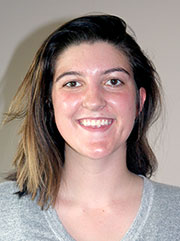The year I turned 18 was a big year for me, as I believe it is for most people. Turning 18 means you’re a real adult, moving off to college and making decisions that will affect your future. It was a milestone year, having my senior night in basketball, my last prom and high school graduation.

Briley Eilers
There was one thing in particular I was looking forward to in the fall, however. Yes, college was exciting and new, but I was anxious to participate in what I deemed my first contribution to society as an adult. November of 2016 was my first chance to vote in a big election, and as everyone remembers, that was a year that changed a lot in American politics.
As much anticipation as I had, when it came time to vote, I didn’t end up casting a ballot. A resident of Illinois, my voting had to take place in the state I was registered to vote. I intended to send in a ballot by mail, but never actually got around to doing it.
I think it’s a problem a lot of college students have and even quite a few adults in our country. We have every intention of voting, of being a part of the democratic process that we deem makes America truly great, but for some reason, we never get around to it.
What’s the solution to getting more citizens involved? I don’t want to single out the rest of state’s demographic, but there is a mass of voters on our college campuses that don’t get around to voting. A study finished in 2014 by the US Census Bureau found that voters aged 18-24 have the lowest voter turnout from 1962 to 2012.
Creating a habit of being involved in the political process can and should start at an early age. At 18, most young adults move out from under their parents and begin to develop their own ideas and beliefs. New interests are picked up and young adults have the freedom to explore, in university classes and otherwise. Students have some of the greatest access to research and information, with events happening constantly on campus, professors available to answer inquiries and at state flagship campuses like Mizzou, thousands of researchers and political minds not too far away.
While responsibility lies on the students themselves to get involved, it is the responsibility of those running for local and state offices and those who are directly involved in the democratic process to engage them. Yes, some students only call central Missouri home for four years, but many find jobs in Kansas City, St. Louis and Columbia. As I myself am looking to stay in the Columbia/Ashland area for at least some time after graduation and what happens in elections this year can affect the decisions I make four years down the road. I’ve even seen the affects of an Eric Greitens run at the governor’s office and what that can do to government, education and also the state of journalism in Missouri.
And what if you aren’t directly involved in the democratic process?
If you’re a voter, you have a role in the democratic process. If you don’t vote, begin voting. Be informed about the decisions you are making during elections. By making your decisions, you cause my generation to make decisions; we can either agree with the elected officials you’ve chosen and keep them, or we can change the course of politics. Teach your children about the decisions you’re making and how it affects them, even if they aren’t close to voting age. Let them see you being involved in the process. I have found that, as much as I don’t always want to admit it, I am my parents’ child. I am involved in all the activities they were involved in as I was growing up.
Keep us involved in the process. One day soon we will be continuing the process.








Facebook Comments